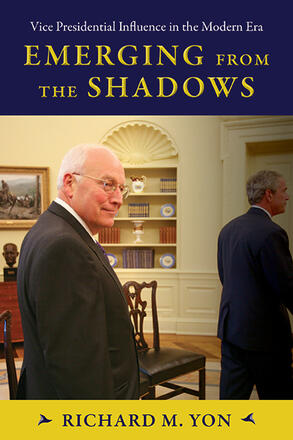
Emerging from the Shadows
Vice Presidential Influence in the Modern Era
Alternative formats available from:
First-of-its-kind study offering a model for understanding vice-presidential influence in the modern era.
Description
Although once derided as an insignificant office, the vice presidency in the last forty years has witnessed an increase in stature, prominence, and influence. Emerging from the Shadows focuses on explaining variation in vice presidential influence over time with an assumption that all vice presidents in the modern era have the capacity to exercise influence. This study is the first of its kind to ascertain the true nature of vice-presidential influence and the consequences of changing interpersonal, situational, institutional, and electoral dynamics on that influence using in-depth interviews and archival research. These four dynamics, as Richard M. Yon demonstrates, provide a model by which to understand the fluidity of vice-presidential influence, which in turn enables more precise analysis of the vice presidencies of Nelson Rockefeller, Walter Mondale, George H. W. Bush, Dan Quayle, Al Gore, Dick Cheney, and Joe Biden.
Richard M. Yon is Associate Professor of Political Science at the United States Military Academy at West Point.
Reviews
"Emerging from the Shadows makes a substantial contribution to the field of executive branch politics, one that will be of interest to researchers in multiple disciplines (political science, the law, public policy, and history). In this book, Yon convincingly argues that the vice president's power and capacity for influence has expanded over the last half century. This very readable book will be a tremendous resource for both academics and practitioners, and I have no doubt it will be of interest to academics and non-academics alike." — Jordan Ragusa, author of Congress in Reverse: Repeals from Reconstruction to the Present